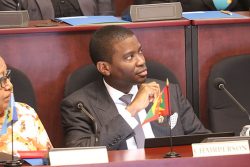BRASILIA, (Reuters) – Brazilian President Luiz Inacio Lula da Silva is risking his ruling party’s chances at next year’s presidential election by sticking with his hand-picked candidate despite her battle with cancer.
Lula publicly backed his chief of staff Dilma Rousseff after her hospitalization last week with pains related to her chemotherapy treatment and he has discouraged all talk of alternative candidates from his ruling Workers’ Party, or PT.
“He doesn’t want a public debate on this. It’s a sensitive issue,” Jacques Wagner, governor of the northeastern state of Bahia and an influential member of the PT, told Reuters.
Despite Rousseff’s stiff public persona, Lula is convinced by her management abilities and thinks Brazil is ripe for a woman president after he shattered a barrier as its first working-class leader.
But she was already trailing in polls and her lymphoma cancer has added to doubts over whether she can win the vote and continue the Lula policies that have reduced poverty, pleased investors and allowed for several years of strong growth before the global economic crisis forced a slowdown.
With 16 months left before polling day, analysts say Lula still has time to nurture an alternative candidate to face Sao Paulo state Governor Jose Serra, who is the likely opposition candidate and leads Rousseff by around 25 points in polls.
But admitting the possibility itself could weaken the PT and there are no obvious alternatives left in the party after a series of corruption scandals in recent years that discredited rising stars such as Rousseff’s predecessor as chief of staff, Jose Dirceu, and former finance minister Antonio Palocci.
That means it would be difficult to replace Rousseff in a rush if she had to break off her campaign late in the race.
“You don’t just pull a candidate out of the hat. Lula has been grooming Dilma for two years,” said Sao Paulo-based political scientist Ricardo Ribeiro.
“With no Plan B, it’s a risky strategy.”
Palocci’s name has resurfaced as a fallback candidate since Rousseff’s illness was made public, but he still faces investigations into his role in a 2005 corruption scandal.
Justice Minister Tarso Genro was seen as a possible candidate before Lula backed Rousseff but he doesn’t have much of a following inside the PT and Education Minister Fernando Haddad, a well-liked figure whose name was also mentioned, also has little sway in the party.
Third term?
Doctors say Rousseff has a 90 per cent chance of a full recovery and her supporters say a strong sympathy vote could help her win the election. But analysts say it’s uncertain how voters will react to lingering health concerns. Many still have memories of President-elect Tancredo Neves, who died in 1985 of intestinal disease before taking office as Brazil’s first democratically elected leader after 21 years of military rule.
The highly popular Lula is barred from running for a third consecutive term and has shown no interest in changing the law to do so, as some have called for.
The chief justice of Brazil’s Supreme Court recently said any push to overhaul the constitution to allow for a third term would probably be blocked by the court. Still, Congress member Jackson Barreto of the governing coalition partner PMDB on Thursday put forward a proposal for a referendum in September to amend the constitution. It won initial approval but still has several hurdles before it could be voted on by Congress’s lower house.
Lula’s staunch backing of Rousseff’s candidacy appears to be costing him some political capital as the PMDB demands more in exchange for backing a weakened candidate.
The centrist party, the largest in Lula’s coalition, said in exchange for backing Rousseff it wants the PT to pull out of gubernatorial races in at least 10 of the 26 states in the October 2010 election, a move that would boost the chances of PMDB candidates.
The PMDB will also head an inquiry into alleged tax and procurement irregularities by the state-owned oil company Petrobras, where Rousseff is chair of the board.
PMDB leaders in the Senate are demanding a top post for the party in Petrobras as the price for supporting the government in the inquiry, according to local media reports. “In Congress, anxiety (over Rousseff’s candidacy) will most likely translate into a slightly less loyal PMDB,” Christopher Garman, Latin America analyst with Eurasia Group consultants, said in a research report.
All that does not bode well for Rousseff’s candidacy or potential government. But analysts say the final judgment is still out on the former urban guerrilla, who was tortured in prison during military rule.
“If she recovers, her fighter image could be strengthened,” said Ribeiro. “She could bounce back stronger.”





